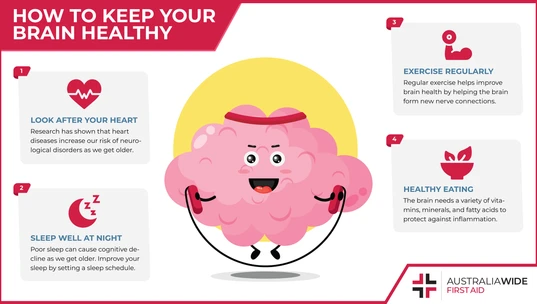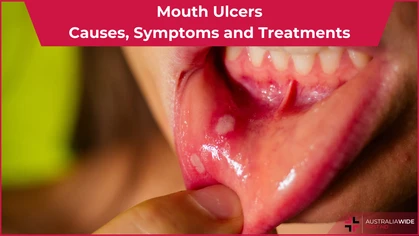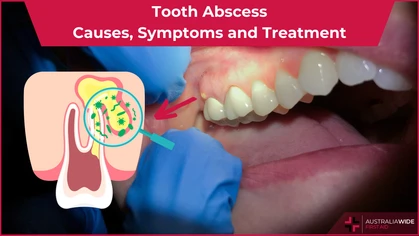4 Ways to Keep Your Brain Healthy

General Health-Related

Brain health is vital for a good quality of life, as neurological decline is a natural part of ageing and can lead to dementia and other chronic conditions. There are several ways that you can improve your brain health from home, including diet and physical activity.
A healthy brain keeps you alert, active and maintains your cognitive abilities. Ageing results in cognitive decline and decreased brain function. Look after your brain health to lower risk of dementia and other chronic diseases by staying active, sleeping well and having a good eating habit.What is Brain Health?
The World Health Organisation refers to a good state of brain health when a person is optimised to function under the four domains, cognitive, emotional, psychological and behavioural in order to lead a good quality of life. Whether you are young or old, looking after your brain health is vital. It is especially crucial in the middle ages between 40 to 65 years old. This is because as we age, our brains undergo changes that impact our thinking abilities and memories. This is a normal part of ageing. Looking after the health of your brain lowers risk of dementia and other chronic diseases such as diabetes and cardiovascular diseases.Why is Brain Health Important?
The brain is the most important organ in the body. It is the command centre of our nervous system and it controls and coordinates all actions of the body. A healthy brain keeps you alert, active and ensures a positive mental health. With ageing comes the decline of brain function and neurological disorders. A recent study found that a large number of people diagnosed with neurological disorders eventually suffer from physical disability, mental illnesses and social dysfunction. Thus, keep your brain healthy by staying active and reduce all factors that affect your brain negatively. Today, we are going to cover four methods that can help to improve your brain health:1. Look After Your Heart
Brain health and the health of your heart are connected. Research has shown that heart diseases increase risk of dementia and neurological disorders as we get older. These cardiovascular problems are most commonly a result of poor lifestyle choices, for instance, sedentary lifestyle and having a poor diet. Improve your heart health by:- Getting regular check-ups: This is especially important if you have a family history of heart conditions. Keep monitoring your blood pressure, cholesterol and blood glucose (sugar) levels regularly.
- Keeping your weight constant within the healthy range: Build a healthy eating habit and pattern with a conscious effort to control portion sizes. If you require help losing weight, reach out to a health professional.
- Stop smoking: Smoking affects both the heart and the brain. There is no safe level of smoking. If you plan to quit smoking, have a talk with your doctor. They may supply you with nicotine replacement gums, patches or sprays.
- Reduce alcohol consumption: Drinking too much alcohol long term can cause damage to your brain and result in cognitive decline. Limit your drinking according to the Australian guidelines of two standard drinks in one day and have at least two days no alcohol every week.
2. Exercise Regularly
A sedentary lifestyle and staying inactive is one of the main factors that cause cognitive decline and decreased brain function in the later part of our lives. 75% of Australians aged 65 years and older are not sufficiently active within the guidelines recommendations set by the Australian Department of Health. Exercising improves brain health, thinking abilities and memory by:- Increasing oxygen-rich blood to the brain cells
- Increases number of new brain cells
- Protects cognitive abilities when older
- Lowers risk of being diagnosed with conditions that impact the heart and the brain
- Better sleep at night and better mood during the day
- Reduce risk of falls
- Keeps you socially engaged
- 30 mins of moderate intensity physical exercise for five days in a week
- Muscle strengthening activities twice a week
3. Sleep Well at Night
Sleep is very important to maintain good brain health. Sleep disturbances, waking up frequently or having a poor quality of sleep cause cognitive decline and dementia when older. Improve your sleep by:- Setting a sleep schedule.
- Create a good sleep environment: You should feel comfortable. Temperature is neither too hot nor too cold. Distraction free environment with no TV or phones.
- Limit napping in the afternoon to half an hour.
- Stay physically active during the day.
- Do not use sleep inducing medications for the long term: These medications belong to the benzodiazepine drug class and should be used for short term only to fall asleep faster. If it is used for long term, you may become resistant to it and require higher dosage which has risks.
4. Healthy Diet
The brain needs a variety of nutrients to function optimally. Vitamins, minerals and essential fatty acids protect the brain from inflammation with their antioxidant properties. Additionally, a healthy diet aids in maintaining a healthy weight. Being overweight or obese causes high blood pressure and increases the risk of disbetes, heart problems and dementia. A healthy diet and good eating habits improve brain health. According to the Australian Dietary Guidelines, ensure to include in your diet foods from all the five food categories every day. They are:- Wholegrains (Bread, rice, pasta, cereal)
- Vegetables
- Fruits
- Dairy
- Lean meat
- Saturated fats and trans fats: It is well known that not all fats are bad. Avocado, fish and nuts contain essential fatty acids that increase blood flow to the brain and improve cognitive function, memory and reduce risk of developing dementia. Saturated and trans fats are unhealthy for the body and studies have shown that they increase the risk of developing dementia and Alzhemier’s disease.
- Salt: Too much salt is detrimental to the brain. Studies have found that lower salt intake results in higher cognitive function and better brain health. Stay clear of frozen meals, junky fast foods, processed foods and packaged foods that are high in salt.
- Hidden added sugar: High sugar levels in the body cause inflammation and neurodegenerative conditions such as dementia and Alzhemier’s disease. It is a good idea to have a look at the ingredients list and the nutritional label before deciding to buy any food products.
Conclusion
Assist those in a health crisis, and book a First Aid course with Australia Wide First Aid today.
Originally published at
https://www.australiawidefirstaid.com.au/resources/4-ways-to-keep-your-brain-healthy
as part of the Australia Wide First Aid Articles Library









